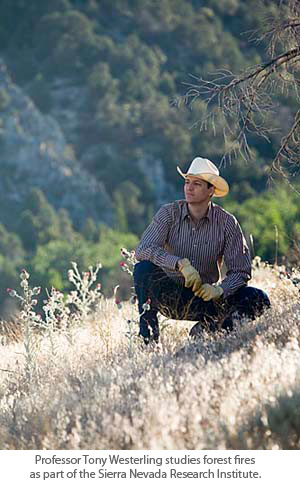

When the weather warms up in the American West, most people are just enjoying the blooms and greenery. But fire-watchers know the lush landscape will turn into tinder when temperatures soar. And the more plant material there is, the more flammable the countryside will become.
One researcher watching the fire seasons with particular attention is UC Merced’s
Tony Westerling,jointly appointed in the
School of Engineeringand the
School of Social Sciences,Humanities and Arts. Westerling’s 2006 paper about large wildfires and climate change, published in the journal Science, was cited by Thomson Scientific’s ScienceWatch.com as the Fast-breaking Paper of the Month in geosciences for February 2008.
The paper was in the top 1 percent of papers in the geosciences in terms of being cited by other scientists in their publications. It also showed the largest percentage increase in citations in the past few months of any highly -cited paper in the geosciences.
Westerling’s paper gained national attention on its publication, with articles appearing in newspapers nationwide. The new assistant professor even found himself a guest on National Public Radio’s Science Friday before starting work at UC Merced in July 2006.
He and his colleagues at the University of Arizona
published a statement in 2007following severe fires in Southern California clarifying what kinds of fires their research had successfully linked to global climate change. The Southern California chaparral fires were not among the group - their research focused on forest fires. This 2007 statement also gained widespread notice in the media.
ScienceWatch.com has published commentary by Westerling about the 2006 paper and his own background and experience. The site also plans a podcast interview with him.
In the commentary, Westerling noted that the increase in forest fires has been very large, in terms of the number of large forest wildfires, total area burned in these fires, the length of the fire season, and the length of time individual fires burn.
This research is the first to conclusively link the increase in wildfire to trends toward warming and earlier springs, implying that global warming will tend to increase wildfire in forest ecosystems where snow plays an important role in the hydrology, he said.






